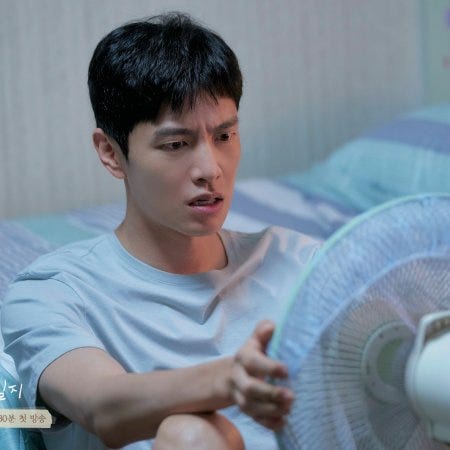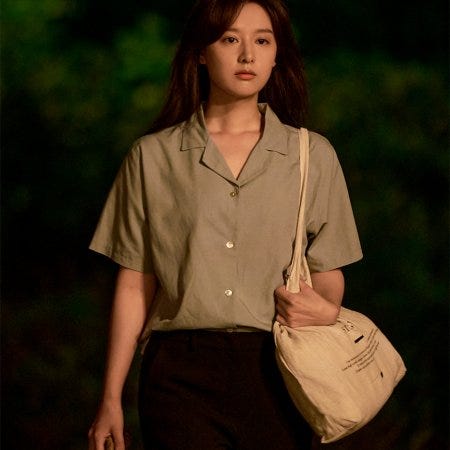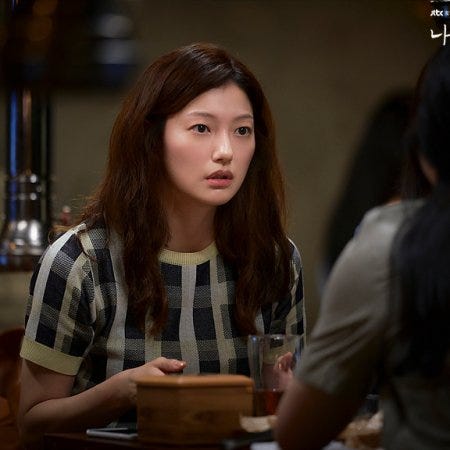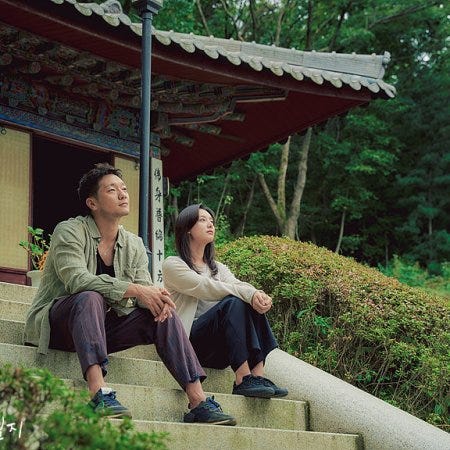Lee Min-gi, Son Suk-ku, Lee El and Kim Ji-won headline this slice-of-life family drama centred around the exploits of three adult siblings who commute from rural Gyeonggi-do to urban Seoul for work regularly. While the premise doesn’t seem like much of a plot for a 16-episode drama, it provides a brilliant staging point and catalyst for delving into the struggles of directionless men and women who wander around the complex landscape of contemporary South Korea in search of meaning and love while barely keeping their heads above the water. The three siblings Ki-jung, Chang-hee and Mi-jung (Lee El, Lee Min-gi and Kim Ji-won respectively), still living with their parents on their property, are disenchanted with what life has to offer. Work pays the bills and occasionally offers opportunities to socialize beyond the dreary treadmill of uncomfortable family dynamics. There’s a little small voice in each that suspects there’s much more to life than the daily grind of gainful employment that seems to be leading nowhere. All three, like everyone else, are also in search of love and perhaps also a lifetime partner. And no, I don’t think for them that is necessarily the same thing. The experience of being in love (at this point at least) trumps finding Mr Right for the two discontented sisters. Falling in love is a pleasing narcotic that can potentially numb the pain. It is also is the panacea to their humdrum existence causing the ordinary becomes less ordinary and if the hand that’s been dealt is played right, they may even reach the dizzy heights of something much more extraordinary.
This is the kind of show that is best watched at a leisurely pace — savouring every line, every interaction and every nuanced expression. It’s a tricky one to pin down other than to offer something banal along the lines that it is wholly concerned with the human condition. But it is true that the drama is almost entirely about what it means to be human — warts and all. Despite the ordinariness of the people and their experiences, there is something wonderfully magical about the storytelling that transports the viewer from the familiar into the metaphysical. It’s almost a sin to be binge-watching an artfully crafted story like this.
There’s much to appreciate about this show. In fact, there’s really nothing I dislike about it. The longshots. Tracking shots. Close-ups. It’s all pointing to something awry in the terrain. This combination of Law School’s PD and My Ahjussi’s writer yields a compelling mix of character and stories. While it’s been said to me that some find it draggy, I barely notice the time passing by as I linger contentedly in the worldbuilding. What however stands out to me is the dialogue or more precisely… the speechifying. Not everyone is inclined to talk in this drama but those who do, overcompensate and suffer from spurts of verbal diarrhoea. Chang-hee prattling away like an aspiring white collar philosopher and Ki-jung muses about her lack of success with men to anyone who happens to be nearby. These two have thoughts they must declare to the world otherwise death and despair awaits. There’s an impulsive urgency driving them to make proclamations because silence for them is a state of existing in a vacuum for which there is no way out.
The harsh reality of course is that the siblings are their own worst enemies. They hate the commute or so they say because it hinders them from flourishing. It becomes obvious that on some level doing the long commute is a choice that they’ve made along with many other ones that see them in a comfortable rut. There is a familiar convenience and comfort which that kind of routine affords. Living with parents provides them with anchor and opportunity to escape from actual responsibilities of ownership and what that entails. When they want to they return to a home cooked meal and a roof over their heads even after a night out socializing with friends or workmates. It’s safe and there’s no risk. On some level it seems prudential but risk-free living ultimately is dull as dishwater. It isn’t living but existing. Human beings have to live out the consequences of their actions to grow and develop into adults. However, the Yeom siblings have been stunted in their growth. Their immaturity spill out in the things that they say and do. Chang-hee can’t even make a decision about buying himself a car at his age which is why his father tells Chang-hee that he should just go ahead and keep his secrets about the things he’d like to do with a woman in a car.
It’s no accident then that Chang-hee is a well-meaning busybody on top of being a garrulous pontificator. This is where the genius of the script come into its own. His speech acts (to borrow from linguistics) point to his general disappointment with life and his unconscious need to gain the approval of his normally taciturn father who plods away in his carpentry business and family farm. The son and father barely have a relationship except when Chang-hee has a proposition to put forward. This uneasy insecurity that marks Chang-hee’s ongoing discourse with his family spills over into this tenuous relationships with women. He never feels that he’s good enough so in his shouting match with girlfriend Ye-rim in the first episode, he takes offence at everything she says in order to maintain control over the interaction so that he can make the claim that it was he who initiated the break up — all that in a desperate bid to maintain some semblance of control where he has none. He is a self-professed loser who loathes the idea of being on the losing end. He wants a woman in his life but he lives in constant fear that he can’t hold on to her once she sees past the savage wit and the bravado. In so doing, he sabotages his any chance of a long-term relationship.
Mi-jeong is getting threatening messages from the bank about loan payments. She soon develops a connection with their enigmatic soju-addled neighbour Mr Gu (Son Suk-ku) after using his address to avoid being found out by her own family. This connection gradually goes beyond expediency to attraction. She gets it into her head that she wants to be “worshipped” by him believing that the entire transaction would be do them both some good — she might end up mildly happier and he might have something else to do in his free time other than imbibing alcohol. It’s an odd way to get a guy to date you but after a few missteps, Mr Gu eventually obliges in so far as a man of his inclinations does. The thrilling long jump that he performs in front of the family to retrieve Mi-jeong’s hat has far-reaching symbolic ramifications. It signals his intentions to “worship” Mi-jeong as requested by bridging the distance between them. It’s also the first clue after a year of working as a hire hand for Mr Yeom that there’s more to him than being a bottomless receptacle for alcoholic beverages.
As someone who is disturbed when the word “worship” is used for anyone else other than God, it begs the question as to whether this set-up portends tragedy. Obviously I would rather not harbour such unhappy thoughts but two strangers falling in love over soju and side dishes are bound to hit a snag eventually.
At work Mi-jeong does very little mixing with her colleagues. She’s the quintessential loner and on some level, prefers it that way. The company she works for insists that everyone belong to an outside of work hours club of which there are plenty to choose from. She doesn’t want to and uses the long commute as an excuse. The club organizer however is annoyingly persistent. So Mi-jeong and two men from other departments eventually come together to form the Liberation Club which involves little more than sitting around and waxing psychological about existential questions. Not long afterwards the club nanny insists there needs to be evidence of activity for the club to be legit so the trio each procure a diary and start their liberation notes. One of the club’s members is Jo Tae-hun, a single dad who also happens to be the brother of Ki-jeong’s former classmate.
After an embarrassing instance of putting her foot in her mouth, Ki-jeong eventually casts her eye on Tae-hun. She’s determined to fall in love with someone in her winter wonderland and she does. She finds an unexpected confidant-counsellor in her office’s reputed serial dater ,Park Jin-u, and surprisingly their platonic ruminations become some of the more delightful aspects of the show. Neither seems romantically interested in the other but find themselves sharing a similar outlook on love. There’s no baggage to contend with so they talk comfortably like old friends much to the surprise and chagrin of their colleagues.
Now comes my dilemma. Which guy should I barrack for to end up with Mi-jeong?
The pull of the drama comes from how effectively it has you invested in the characters and their outcomes whether as individuals or pairings. Even if they are their own worst enemies or suffer paralysis by analysis, they are real and relatable. The Yeom siblings are hardly perfect and their worst aspects are stripped bare for all the world to see. Yet, I find myself rooting for them and wishing them all good things as they find their way out of the miry pit that they’ve dug themselves into. Because character is almost everything, the performances alone are worth the monthly subscription to Netflix. Lee Min-gi and Son Suk-ku in particular are standouts.
Watch me join the hype.







